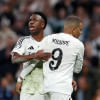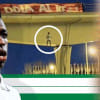Vini, Vidi, Rodri: The Ballon d’Or conundrum

It has been a long time since the Ballon d'Or ceremony has seen a group from the crowd openly heckling. Perhaps that's a testament to how far ahead of the competition Lionel Messi was whenever he was nominated. But this year was different—and open to debate. There's a strong palpable sense of disagreement over the eventual winner.
The 2023/2024 season had its share of outstanding individual moments. The brilliance of Xabi Alonso's Bayer Leverkusen winning the Bundesliga without losing a single match. Jude Bellingham's "I am him" affirmations in pivotal moments. Phil Foden finding his limelight again. Harry Kane's golden boot, despite another trophyless season. The coolness in Cole Palmer. Lamine Yamal's swerving shots that made you forget that he has school the next day. Star power was in abundance. However, to win a Ballon d'Or, in theory, you need to be extraordinary, and this year, it seemed Vinicius Jr was all but guaranteed to win after his crucial role in helping Real Madrid clinch the Champions League. Yet, he was not named. It was Spain and Manchester City's Rodri who walked home with the coveted award.
Frankly, Rodri's name was not a common pick among fans this year. Vinicius Jr had always been at the forefront. Just ask Rio Ferdinand—he mentioned the word "Ballon d'Or" nine times as Vinicius dribbled to finish off the match for Real Madrid in the Champions League final. Haaland's name floated around, but City's failure to retain the Champions League and Norway's failure to qualify for the Euros put him out of contention. The emphasis on performing well in international tournaments continues to disrupt the concept of who qualifies as a worthy Ballon d'Or winner.
This debate continues to rage, affecting the credibility of the awards. It's a recurring theme: if there's a major international tournament and you don't play a role in it, you might as well skip the ceremony. Last year, Erling Haaland's brilliant season led City to finally secure the Champions League—the only trophy that was missing from their trophy cabinet. Yet, despite all his individual brilliance—his goals, statistics, and impact—it seemed nothing would stop Lionel Messi from winning his eighth Ballon d'Or for his World Cup 2022 performance. This was true even though Messi missed several matches, switched teams mid-year, and moved to a less competitive league. International tournaments continue to remain the most influential factor in the award's outcome. Perhaps Vinicius' limited impact for Brazil in the Copa America played a decisive role in voter's mind. With Brazil exiting in the quarters and Vini scoring only twice, his performances in La Liga and Champions League would have had to significantly outweigh other players' individual achievements.
Truth be told, even if you hold international tournaments as the pivotal factor, Rodri is still not the first name that comes up. Jude Bellingham does. In his first year with Los Blancos, Bellingham played a starring role in conquering La Liga, the Champions League, and the Super Cup. At the international level, he helped England reach another European final. With 27 goals and 15 assists, Bellingham was eventually voted third in the Ballon d'Or, while his teammate Dani Carvajal, who finished fourth, was a rare defensive inclusion. Ordinarily, the Ballon d'Or is almost always given to players who play in an attacking role, and that is why Carvajal's inclusion is welcome. The defender won all three trophies with Real and then the European Championship with Spain. So, the question arises: how did Rodri win over Carvajal, despite Carvajal winning more last season? The answer is pretty obvious—Carvajal's season, while strong, was not the best individual performance worthy of the award.
Rodri's win also invites debate on whether he truly deserved the trophy. He was not the best player in the Premier League last season. In fact, he was not even the best player at City—that was Phil Foden. But his role in City's midfield has been crucial for the past few seasons, and without him, the team suffers. He is the best defensive midfielder in the world, and his performance in the Euros earned him the player of the tournament. But this is where the discrepancies lie—the award is for the entire football season, not just one tournament. He already won an award for his performance in the Euros, so why do voters place so much emphasis on international tournaments when voting for the Ballon d'Or? Previously, the counterargument for this was that each tournament only happens every four years. But now, with FIFA and UEFA increasing the number of international tournaments, should they continue to be such a decisive factor?
On the day of the Ballon d'Or ceremony, a list was leaked with Rodri's name at the top, which prompted the entire Real Madrid club to boycott the award. Carlo Ancelotti, who won the Manager of the Year award, was not present and neither were Jude Bellingham, Vinicius Jr, or Dani Carvalho. The snub of Vini has once again raised questions whether racism played a role in the voting, or if it's the ongoing cold war between UEFA and Real Madrid stemming from the Super Cup drama a couple of seasons ago.
Further reasons stated are that, according to UEFA, a player should be judged on three criteria—individual performances, decisive and impressive character, team performances and achievements, and class and fair play. Vinicius Jr has had his fair share of outbursts, cheeky attempts to delay play, or attempts to get a penalty without any contact. But dismissing his season on these grounds seems weak since no player has ever truly lost the Ballon d'Or for misbehaviour or diving for penalties.
That said, if there's a player who embodies a true role model, it's Rodrigo Hernández Cascante. Playing in perhaps the most unacknowledged position, but one that plays a pivotal role in modern football, Rodri has redefined how a defensive midfielder can progress play to turn defence into attack. Far from his footballing abilities, in which he is the best in his position and now best in the world, it is Rodri's hard work, personality, and dedication that makes him a role model. Perhaps the highest-valued footballer without any online footprint, Rodri has always lived humbly—away from the limelight, living in student dorms among his peers, and driving a fiat, despite earning more than most do in their lifetimes. Rodri is a breath of fresh air in the dazzling world of football entertainment, a player whose game is based on elevating himself in order to make the entire team function well.
Recognising Rodri is almost like recognising the unspoken individuals who toil away the hardest in the team, only for the glory to be given to those who apply the finishing touches. However, as some argue that this recognition may be a season too late, it overshadows a larger truth: perhaps football is ready to share its prizes with those who not only taste the cake but bake it.
Raiyan Binte Rafiq is a sports columnist for The Daily Star. She is currently pursuing an LLM, while freelancing for INDIVISA. She also oversees recruitment at Next Level Sports Management based in Bangladesh.
Views expressed in this article are the author's own.
Follow The Daily Star Opinion on Facebook for the latest opinions, commentaries and analyses by experts and professionals. To contribute your article or letter to The Daily Star Opinion, see our guidelines for submission.


 For all latest news, follow The Daily Star's Google News channel.
For all latest news, follow The Daily Star's Google News channel. 









Comments